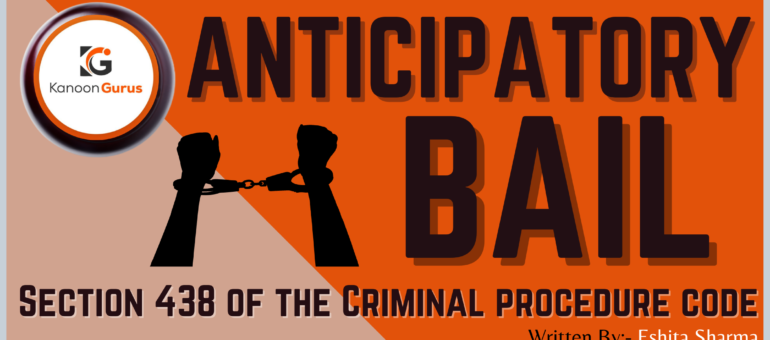CONCEPT OF ANTICIPATORY BAIL
Table of Contents
INTRODUCTION:
As the name suggests, it is the pre-arrest legal procedure whereby bail is granted to the person in anticipation and apprehending arrest in near future.
Section 438 of the Criminal procedure code 1973 embodies the concept of anticipatory bail. This provision empowers the High court and Sessions court to grant anticipatory bail in certain circumstances.
The idea of anticipatory bail was first conceived in the 41st law commission report, 24th September 1969.
DEFINITON AND MEANING:
The term “Anticipatory bail’’ has not been specifically defined under the code. It means bail granted in anticipation of arrest in near future or in layman language we can say that person can escape the expected arrest through this provision given certain circumstances. The whole concept of anticipatory bail has been revised by the Amendment Act of 2005.
WHO IS EMPOWERED TO GRANT ANTICIPATORY:
According to the provision of section 438 of the code, the High court and Court of Session can grant anticipatory bail. The person who has applied for such anticipatory bail shall have strong reasons in support of such application. Such reasoning shall be the premise on valid grounds and not merely the fear of arrest.
Anticipatory bail is usually granted in cases of non-bailable offence and it is immaterial whether such offence has the aspects of the cognizable or non-cognizable offence. Such offence may be under the Indian penal code or any other law time being in force.
EVOLUTION OF ANTICIPATORY BAIL CRIMINAL JURISPRUDENCE :
If we time travel to the era of 1251, the first drafted constitution was adopted by King John of England, which is today known as the Magna Carta.
Clause 39 of the Magna Carta contains the history of the origin of the concept of bail. Amendment act of 2018 has inserted clause (4) to section 438.
Factors associated with anticipatory bail:
• Nature and depth of accusation shall be the core reason to apply for such bail.
• Previous imprisonment and character of the applicant play an important role in the grant of such relief.
• Looking into the circumstances that such future arrest is just for hampering the reputation of the person, this injustice can be avoided by such a provision.
• By enumerating other circumstantial aspects relating to the grant of anticipatory bail.
PROCEDURE OF GRANTING / REJECTING ANTICIPATORY BAIL:
The High court or Court of sessions may after considering the requisite conditions can either grant or completely reject such application, it is the total discretion of the empowered court.
Amendment act 2005 inserted section 438 (1A), it provides that when the court shall before granting the order of interim anticipatory bail shall forthwith the notice to the public prosecutor and Superintendent of police, in order to give out the reasonable opportunity of being heard.
It also provides that at the time of final hearing the applicant of the anticipatory bail shall be mandatorily present in the court.
Provision of anticipatory bail further set forth the various conditions which are necessary according to the circumstance of the individual case.
These conditions may include the following aspects:
1. Person can be restricted to visiting outside India without the permission of the court.
2. Person who has been granted the bail under section 438 of code shall refrain himself from any kind of inducement, threat or promise to any such person who is acquainted with the factual details of the case so as to restrict such person from disclosing the intricate details of the case to the authorities.
3. Such person shall make him available for any kind of interrogation by the requisite authorities.
4. Any other condition imposed under section 437(3), by looking into the circumstance of the case.
PRINCIPLES WITH REGARD TO ANTICIPATORY BAIL
Supreme Court has laid down the following principles of anticipatory bail in the case named “Gurubaksh Singh Sibba v. the State of Punjab”:
• Registration of FIR is no condition precedent in order to avail the anticipatory under section 438 of the code.
• Before passing the final order compulsory notice shall be given to the public prosecutor.
• Order under section 438 code does not hamper the investigation of the police.
• Blanket order is strictly prohibited.
RELEVANT CASE LAWS:
1. SUSHILA AGGARWAL V.STATE (NCT DELHI) AND ANOTHER
Court held that there is no specified time limit attached to anticipatory bail but in certain circumstances the court can always attach such a time limit.
2. UNION OF INDIA V.PADAM NARAIN UNDER
Court held that in the event of arrest of a person, he shall be released from such arrest as soon as an order for anticipatory bail comes into force.
CONCLUSION:
Anticipatory bail is the provision that has been inserted for the protection of the liberty and reputation of an individual. It shall be granted in exceptional circumstances. It protects the person from illegal arrest which may happen in the near future as a result of a conspiracy or on fraudulent grounds.

